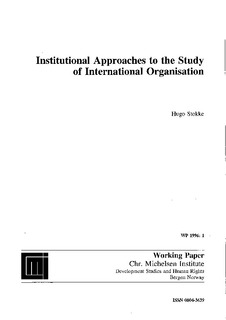| dc.contributor.author | Stokke, Hugo | |
| dc.date.accessioned | 2008-03-05T07:49:15Z | |
| dc.date.accessioned | 2017-03-29T09:12:56Z | |
| dc.date.available | 2008-03-05T07:49:15Z | |
| dc.date.available | 2017-03-29T09:12:56Z | |
| dc.date.issued | 1996 | |
| dc.identifier.issn | 0804-3639 | |
| dc.identifier.uri | http://hdl.handle.net/11250/2435975 | |
| dc.description.abstract | This paper gives an overview of changes and shifts in the study of international organisation and notes that research has gradually moved away from the study of de facto organisations to studies of international cooperation and coordination in a more general sense. Current approaches to the study of international organisation are reviewed and emphasis is given to the interplay of cognitive and normative factors. The paper concludes with a recommendation to use organisation theory more systematically in the study of de facto international organisations. | |
| dc.language.iso | eng | |
| dc.publisher | Chr. Michelsen Institute | |
| dc.relation.ispartofseries | CMI Working paper | |
| dc.relation.ispartofseries | WP 1996: 1 | |
| dc.subject | Organisation theory | |
| dc.subject | International organisations | |
| dc.subject | International relations | |
| dc.subject | Institutional framework | |
| dc.title | Institutional Approaches to the Study of International Organisation | |
| dc.type | Working paper | |
